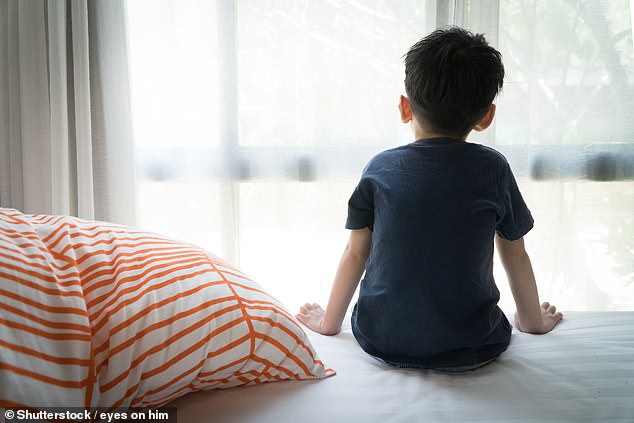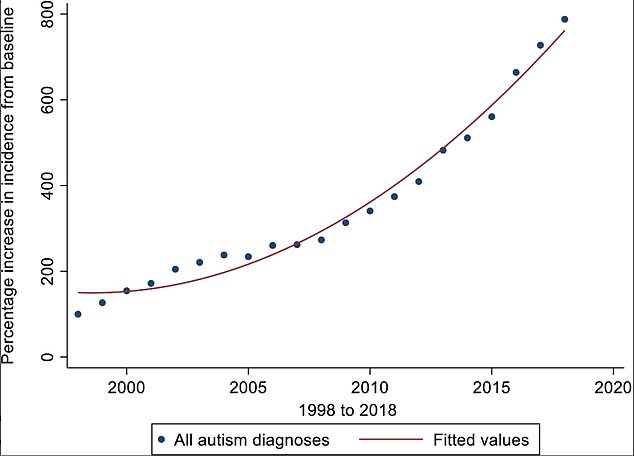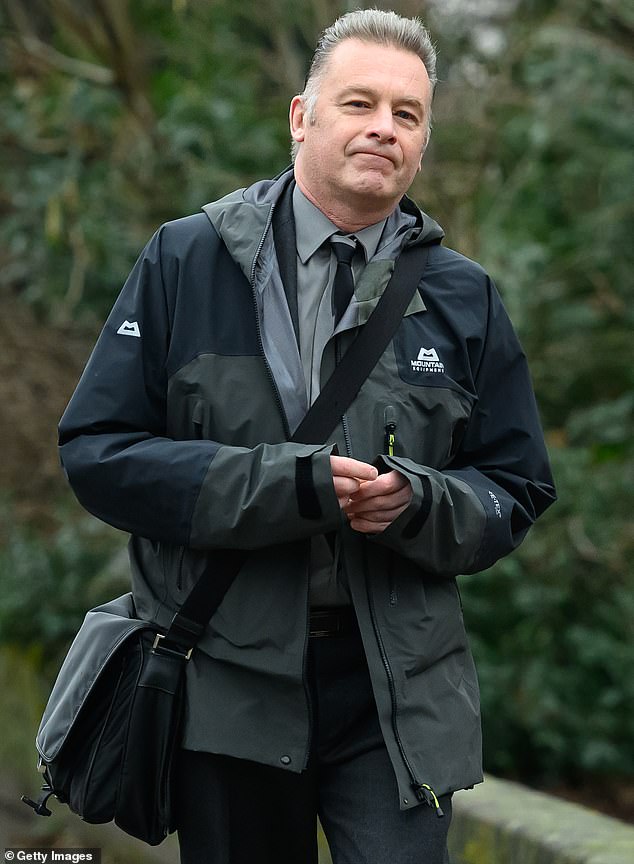Children are enduring “harmful” waits of more than four years for diagnoses of autism and mental health problems.
A young man waited 1,518 days (approximately four years and one month) for his diagnosis at NHS Ayrshire and Arran.
Another on NHS Tayside had to wait 1,323 days – around three and a half years – for doctors to confirm his diagnosis of neurodevelopmental disorders.
Waiting lists for autism evaluations aren’t faring much better south of the border amid staffing shortages and growing demand.
Tens of thousands of children suspected of having autism in England have been waiting at least three months for an assessment to confirm their diagnosis.

NHS England data shows tens of thousands of children suspected of having autism have been waiting three months or more for an assessment to confirm the diagnosis (file image)


This graph shows the percentage increase in the incidence of autism diagnoses from 1998 to 2018. UK researchers found that autism diagnoses had increased an “exponential” 787% in 20 years. They said the increase could be due to greater recognition of the condition among experts, particularly in the diagnosis of autism among girls and adults, but added that an increase in cases of autism itself could not be ruled out.
Guidance from the National Institute for Health and Care Excellence states that no one should wait longer than that time.
But almost three quarters of the 110,000 NHS children with an open referral for autism were in this situation in December, figures show.
According to MailOnline’s analysis of the latest available data, this figure rises to 100 per cent in a single trust.
The 2,645 under-18s with open autism referrals at Northamptonshire Healthcare NHS Foundation Trust (FT) have been waiting more than 13 weeks for an assessment.
High rates were also recorded in Surrey and Borders Partnership NHS FT (94 per cent), North East London NHS FT and East Kent Hospitals University NHS FT (both 93 per cent).
The data on diagnostic waiting times in Scotland was obtained by the Scottish Liberal Democrats through freedom of information requests to health boards.
Party leader Alex Cole-Hamilton said: “For parents and children waiting for a diagnosis to open the door to support services, these revelations will feel depressingly familiar.
‘These excessive waits can be particularly harmful for children with autism and neurodevelopmental problems.
‘It only delays a diagnosis that will be key to ensuring they receive the help they need in other aspects of their lives.
“The Scottish Liberal Democrats have repeatedly called for better support, and now is the time for the Health Secretary to act to ensure everyone waiting gets the help they need.”
His comments came as the Scottish Children’s Services Coalition (SCSC) called for more support for children and young people with additional support needs, such as autism, dyslexia and mental health problems.
It said per-pupil spending on additional learning support had fallen by more than a third, from £5,698 in 2012-13 to £3,764 in 2022-23.
The number of children needing additional support more than doubled to 241,639 (more than a third of all pupils) between 2021 and 2022.
Meanwhile, the SCSC said the number of full-time equivalent additional support needs specialist teachers had fallen from 3,390 to 2,844, a decrease of 16 per cent.
A spokesperson added: “We are facing a lost generation of children and it is vital that they receive the care and support they need.”
It comes amid what experts have recognized as an explosion in autism rates in the UK in recent years.
Some experts have repeatedly noted that this is the result of growing awareness about spectrum disorder, which was only widely diagnosed as a condition in its own right this century.
This has led to a “backlog” of cases, especially among women and girls who were less likely to be diagnosed in the past.
An additional factor that may have contributed to the increase is the disappearance of Asperger’s syndrome, which was once considered a separate condition but is now considered another form of autism.
However, others have pointed out that the “wild west” of autism screening in England could mean that overdiagnosis could also play a role.
Earlier this month, a study revealed that adults referred to some autism assessment centers have an 85 percent chance of being told they are on the spectrum.
However, the figure may be as low as 35 percent elsewhere, researchers at University College London found.


Television presenter Melanie Sykes was diagnosed with autism at the age of 51 and shared the news in 2021. She is shown here in London in 2018.


Springwatch star Chris Packham, 62, spoke about his autism diagnosis in 2005 in the BBC documentary Inside Our Autistic Minds, which aired last year. Photographed on February 14, 2024.


Television personality Christine McGuinness has revealed that she was diagnosed with autism along with her three children in 2021. She is pictured here at an event in Manchester last year.
Autism is a spectrum disorder that affects the way people communicate and interact.
According to the World Health Organization, approximately one in 100 children worldwide suffers from this condition.
However, according to a 2021 Newcastle University study, approximately one in 57 children in the UK is autistic.
And again in 2021, experts found that autism diagnoses in England had soared an “exponential” 787 percent in 20 years.
Signs of autism in adults include not understanding how others feel, feeling anxious about social situations, having a strict routine, or seeming unintentionally direct.
Autistic children may avoid eye contact and may not respond when their name is called, among other symptoms.
Named NHS trusts in England have been contacted for comment.

